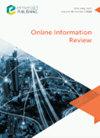信息素养对新闻工作者终身学习、创造力和工作绩效的影响
IF 3.1
3区 管理学
Q2 COMPUTER SCIENCE, INFORMATION SYSTEMS
引用次数: 1
摘要
目的本研究考察巴基斯坦记者信息素养对终身学习、创造力和工作绩效的影响。设计/方法/方法采用调查研究设计来进行本研究。通过分层方便抽样程序从四个省(如旁遮普省、信德省、开伯尔-普赫图赫瓦省和俾路支省)和联邦首都伊斯兰堡的新闻俱乐部招募参与者,并征得有关当局的同意进行数据收集。在这些记者中分发了一份在线问卷,共收到1089份答复。采用SPSS统计软件的描述统计和推理统计对数据进行分析。结果显示,这些记者认为自己具有信息素养。新闻工作者的信息素养(IL)技能似乎对他们的终身学习、创造力和工作绩效有直接和积极的影响。换句话说,记者的终身学习、创造力和工作绩效随着他们的新闻媒体技能水平的提高而提高。这些结果为学者和组织提供了有用的见解,了解IL在工作场所中的重要性及其对组织有效性和绩效的影响,以获得可持续的竞争优势。这些知识对于媒体雇主启动记者培训计划以传授IL教育至关重要。原创性/价值本研究将对现有的工作场所IL研究做出有价值的贡献,特别是在记者工作场所的背景下,因为迄今为止还没有使用这些变量的全面研究。同行评议本文的同行评议历史可在:https://publons.com/publon/10.1108/OIR-06-2022-0345。本文章由计算机程序翻译,如有差异,请以英文原文为准。
Effect of information literacy on lifelong learning, creativity, and work performance among journalists
PurposeThis research examined the effects of information literacy on lifelong learning, creativity, and work performance among journalists in Pakistan.Design/methodology/approachSurvey research design was applied to conduct this research. The participants were recruited through a stratified convenient sampling process from the press clubs of four provinces (e.g. Punjab, Sindh, Khyber Pakhtunkhwa, and Baluchistan) and the federal capital Islamabad with the consent of relevant authorities for data collection. An online questionnaire was distributed among these journalists and a total of 1,089 responses were received. The data were analyzed by applying descriptive and inferential statistics in SPSS.FindingsThe results revealed that these journalists perceived themselves as information literate. The information literacy (IL) skills of journalists appeared to have a direct and positive effect on their lifelong learning, creativity, and work performance. In other words, the lifelong learning, creativity, and work performance of journalists increase as their levels of IL skills increase.Practical implicationsThese results generated useful insights for academicians and organizations about the importance of IL in the workplace and its influence on organizational effectiveness and performance in gaining a sustainable competitive advantage. This knowledge might be crucial for media employers to initiate training programs for journalists to impart IL education.Originality/valueThis research would be a worthwhile contribution to the existing research on workplace IL, particularly in the context of journalists' workplace as no such comprehensive study using these variables appeared so far.Peer reviewThe peer review history for this article is available at: https://publons.com/publon/10.1108/OIR-06-2022-0345.
求助全文
通过发布文献求助,成功后即可免费获取论文全文。
去求助
来源期刊

Online Information Review
工程技术-计算机:信息系统
CiteScore
6.90
自引率
16.10%
发文量
67
审稿时长
6 months
期刊介绍:
The journal provides a multi-disciplinary forum for scholars from a range of fields, including information studies/iSchools, data studies, internet studies, media and communication studies and information systems.
Publishes research on the social, political and ethical aspects of emergent digital information practices and platforms, and welcomes submissions that draw upon critical and socio-technical perspectives in order to address these developments.
Welcomes empirical, conceptual and methodological contributions on any topics relevant to the broad field of digital information and communication, however we are particularly interested in receiving submissions that address emerging issues around the below topics.
Coverage includes (but is not limited to):
•Online communities, social networking and social media, including online political communication; crowdsourcing; positive computing and wellbeing.
•The social drivers and implications of emerging data practices, including open data; big data; data journeys and flows; and research data management.
•Digital transformations including organisations’ use of information technologies (e.g. Internet of Things and digitisation of user experience) to improve economic and social welfare, health and wellbeing, and protect the environment.
•Developments in digital scholarship and the production and use of scholarly content.
•Online and digital research methods, including their ethical aspects.
 求助内容:
求助内容: 应助结果提醒方式:
应助结果提醒方式:


